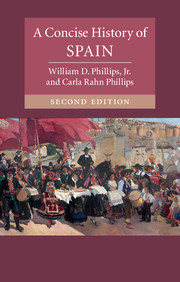Book contents
- Frontmatter
- Contents
- List of illustrations
- List of maps
- Preface
- Note on the second edition
- 1 The land and its early inhabitants
- 2 Ancient legacies
- 3 Diversity in medieval Spain
- 4 The rise of Spain to international prominence
- 5 Spain as the first global empire
- 6 Toward modernity: From the Napoleonic invasion to Alfonso XIII
- 7 The struggle for the Spanish soul: Republic, civil war, and dictatorship
- 8 New Spain, new Spaniards: European, democratic, and multicultural
- Chronology and rulers
- Guide to further information
- Index
- Cambridge Concise Histories
8 - New Spain, new Spaniards: European, democratic, and multicultural
Published online by Cambridge University Press: 05 December 2015
- Frontmatter
- Contents
- List of illustrations
- List of maps
- Preface
- Note on the second edition
- 1 The land and its early inhabitants
- 2 Ancient legacies
- 3 Diversity in medieval Spain
- 4 The rise of Spain to international prominence
- 5 Spain as the first global empire
- 6 Toward modernity: From the Napoleonic invasion to Alfonso XIII
- 7 The struggle for the Spanish soul: Republic, civil war, and dictatorship
- 8 New Spain, new Spaniards: European, democratic, and multicultural
- Chronology and rulers
- Guide to further information
- Index
- Cambridge Concise Histories
Summary
Few things changed in the immediate aftermath of the Bourbon restoration of 1975. Most of the political figures who had served in the last years of the Franco regime continued to serve under King Juan Carlos, including Carlos Arias Navarro, the Prime Minister. The continuity dismayed Spaniards and outsiders hoping for dramatic change, but it provided stability and reassurance for Spaniards who feared change and the disruption it might bring. Newspapers and magazines debated the future of Spain in serious articles and political cartoons alike. The new daily newspaper El País began as a voice for change, strongly allied to the still clandestine Socialist Party but aiming to provide analysis rather than polemic. Farther to the left, the weekly magazine Cambio16 emerged as a harsher critic of the government and its continuity with the Franco regime.
Beneath the surface, however, the king and his close advisers prepared to transform Spanish political life. Inadvertently, the assassins of Admiral Carrero Blanco in 1973 had made a transition toward democracy easier, removing a powerful opponent of change. One of the first indications of that transformation occurred seven months after Juan Carlos came to the throne. Carlos Arias met with the king on July 1, 1976, at the latter's request, and resigned as Prime Minister after the meeting. Arias had taken on a difficult and thankless task two and a half years earlier and had presided over the administration during a crucial period. Pressured from all sides and visibly exhausted, he once reputedly commented that he felt as if he were walking a tightrope, while someone kept oiling the rope.
Two days after Arias resigned, the king chose Adolfo Suárez to form a new government, stunning political observers both inside and outside Spain. Relatively young, handsome, and politically astute, Suárez had risen through the ranks of the Francoist political machine to head the national radio and television network, RTVE. The public knew his face and his background, and conservative forces in Spanish society thought they knew his political stance. They were mistaken. The king had come to know Suárez through official and social contact and recognized in him an ideal partner for his political agenda.
Like the king, Suárez took his oath of office promising to uphold the Francoist constitution, but both of them knew that Spain had to change.
- Type
- Chapter
- Information
- A Concise History of Spain , pp. 374 - 406Publisher: Cambridge University PressPrint publication year: 2015

